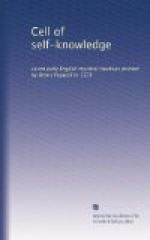Let be this manner of doing, I pray thee, and let as thou wist not that there were any such means (I mean ordained for to get God by); for truly no more there is, if thou wilt be very contemplative and soon sped of thy purpose. And, therefore, I pray thee and other like unto thee, with the Apostle saying thus: Videte vocationem vestram, et in ea vocatione qua vocati estis state:262 “See your calling, and, in that calling that ye be called, stand stiffly and abide in the name of Jesu.” Thy calling is to be very contemplative, ensampled by Mary Magdalene. Do then as Mary did, set the point of thine heart upon one thing: Porro unum est necessarium: “For one thing is necessary,"[263] the which is God. Him wouldest thou have, Him seekest thou, Him list thee to love, Him list thee to feel,[264] Him list thee hold thee by, and neither by silence nor by speaking, by singular fasting nor by common eating, by onliness nor by companious woning, by hard wearing nor by easy; for sometime silence is good, but that same time speaking were better; and againward sometime speaking is good, but that same time silence were better; and so forth of all the remenant, as is fasting, eating, onliness, and company; for sometime the one is good, but the other is better, but neither of them is at any time the best. And, therefore, let be good all that is good, and better all that is better,[265] for both they will defail and have an end; and choose thee the best with Mary, thy mirror, that never will defail: Maria (inquit optimam) optimam partem elegit, quae non auferetur ab ea.266 The best is almighty Jesu, and He said that Mary, in ensample of all contemplatives, had chosen the best, the which should never be taken from her; and therefore, I pray thee, with Mary leave the good and the better, and choose thee the best.




